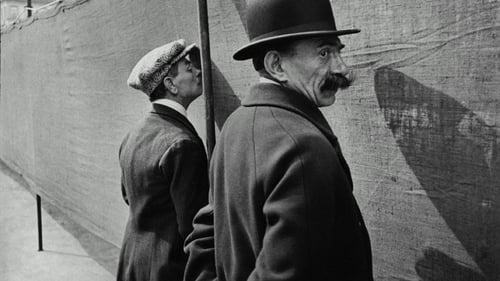
self
Documentary about one of the most important architects of the 20th century.

Self
Heinz Bütler interviews Henri Cartier-Bresson (1908-2004) late in life. Cartier-Bresson pulls out photographs, comments briefly, and holds them up to Bütler's camera. A few others share observations, including Isabelle Huppert, Arthur Miller, and Josef Koudelka. Cartier-Bresson talks about his travels, including Mexico in the 1930s, imprisonment during World War II, being with Gandhi moments before his assassination, and returning to sketching late in life. He shows us examples. He talks about becoming and being a photographer, about composition, and about some of his secrets to capture the moment.

himself
A good insight insights into the one of the greatest minds in photography. Henri Cartier-Bresson (August 22, 1908 -- August 3, 2004) was a French photographer considered to be the father of photojournalism. He was an early adopter of 35 mm format, and the master of candid photography. He helped develop the street photography or life reportage style that was coined The Decisive Moment that has influenced generations of photographers who followed.

Self (voice)
Part one of a BBC documentary about Jean Renoir.

Self
En 1991, la ONG Amnistía Internacional encargó 30 cortometrajes a 30 realizadores franceses, para montar un film colectivo que denunciara casos concretos de violación de los derechos humanos por razones políticas.

Himself
Henri Cartier-Bresson: The Decisive Moment is an 18-minute film produced in 1973 by Scholastic Magazines, Inc. and the International Center of Photography. It features a selection of Cartier-Bresson’s iconic photographs, along with rare commentary by the photographer himself.

Writer
Henri Cartier-Bresson: The Decisive Moment is an 18-minute film produced in 1973 by Scholastic Magazines, Inc. and the International Center of Photography. It features a selection of Cartier-Bresson’s iconic photographs, along with rare commentary by the photographer himself.

Cinematography
Impressions of Mississippi by Henri Cartier-Bresson.

Director
Impressions of Mississippi by Henri Cartier-Bresson.

Director of Photography
Impressions of California as seen by Henri Cartier-Bresson.

Director
Impressions of California as seen by Henri Cartier-Bresson.

Seminarian (uncredited)
Una familia pasa un domingo a orillas del Sena. Mientras los hombres duermen la siesta, unos jóvenes remeros invitan a la madre y a la hija a dar un paseo en barca; un paseo que se convertirá en algo más que una inocente excursión fluvial. Mediometraje de 40 minutos basado en un relato de Guy de Maupassant, en el que Renoir hace un homenaje a su padre, el pintor impresionista Pierre Auguste Renoir. Sus cuadros son mostrados en el film para suscitar una reflexión sobre las relaciones entre cine y pintura.

Second Assistant Director
Una familia pasa un domingo a orillas del Sena. Mientras los hombres duermen la siesta, unos jóvenes remeros invitan a la madre y a la hija a dar un paseo en barca; un paseo que se convertirá en algo más que una inocente excursión fluvial. Mediometraje de 40 minutos basado en un relato de Guy de Maupassant, en el que Renoir hace un homenaje a su padre, el pintor impresionista Pierre Auguste Renoir. Sus cuadros son mostrados en el film para suscitar una reflexión sobre las relaciones entre cine y pintura.

Director
Live footage from concentration camps after the liberation, and the complex transport and lodging of masses of prisoners of war and other deported people back to their home countries, at the end of World War II. A 45min 35mm print also exists (shown at Cinémathèque française in 2023).

First Assistant Director
1939, París y Sologne. Un aviador, enamorado de una mujer de mundo, no respeta la regla del juego que consiste en salvar las apariencias en una sociedad dividida fundamentalmente en dos clases: los señores y los criados.

Le domestique anglais (uncredited)
1939, París y Sologne. Un aviador, enamorado de una mujer de mundo, no respeta la regla del juego que consiste en salvar las apariencias en una sociedad dividida fundamentalmente en dos clases: los señores y los criados.

Director
El Socorro Rojo era una organización que canalizaba las ayudas que sindicatos, organizaciones obreras y partidos de izquierda de todo el mundo enviaban en apoyo a la República Española. Henri Cartier-Bresson documentó la tremenda labor de ayuda a la población civil que desarrollaba la organización, cargado de ilusión y esperanza en la causa republicana.

Director
Película documental realizada por el mítico fotógrafo Henri Cartier-Bresson durante la guerra civil española, sobre los hospitales de la España Republicana.

Director
This advocacy documentary about the Lincoln Brigade was shot during the Spanish Civil War to raise funds for bringing wounded American volunteers home. Some 2,800 Americans enlisted in the International Brigades to fight against fascism in defense of the Spanish Republic. The film was directed by Henri Cartier-Bresson with Herbert Kline and additional photography was provided by Jacques Lemare and Robert Capa. This film is held at New York University’s Tamiment Library and is part of a vast collection of materials in the Abraham Lincoln Brigades Archive.

Director
A propaganda film of the communist party of France, showing how the comrades help the proletariat against the capitalists.

Himself
Documentary about photographer Henri Cartier-Bresson, including footage of him in his Paris and Provence homes and many stills of his works. He talks about his passion for drawing, offers his opinion on different types of photography and shares photos of himself.













